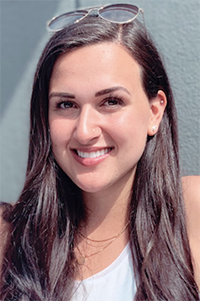
Listening to participants’ experiences at the Physical Activity Research Center inspired Tessa Goldberger, BKin’18, MOT’20 to pursue a career in occupational therapy. In her profile, Tessa shares how active listening continues to play a key role as she enters her new career and her advice for students entering the UBC Master of Occupational Therapy program.
What drew you to pursuing a Master of Occupational Therapy (MOT) degree at UBC?
My initial drive to pursue a Master of Occupational Therapy (OT) degree at UBC stemmed from my role as a supervisor in the Physical Activity Research Center (PARC) which is located in the International Collaboration on Repair Discoveries (ICORD). Throughout my undergraduate degree in Kinesiology at UBC, I always knew that I would complete further education in a field which focuses on enhancing an individual’s physical, cognitive, and emotional well-being. While working at PARC, many of the participants generously shared their experiences of working with an occupational therapist and how OT services had improved their ability to participate in daily occupations, increased their overall independence, and provided them with a sense of hope for the future. It became very evident that this career path encompasses a holistic and client-centered approach in order to enable individuals to engage in meaningful occupations and participate in their community. From this realization, I knew that OT was for me. I can confidentially state that I have gained a tremendous amount of invaluable knowledge and applicable skills over the past two years and I am proud to have developed these skills in a supportive learning environment at UBC.
What is one thing that you are taking with you from your experience in the MOT program?
One thing that I will take with me from my experience in the MOT program and throughout my fieldwork placements is the power of active listening. I know that this may sound like a simple skill that does not require a master’s degree to learn, however, practicing and developing this skill throughout this program has deeply enhanced my ability to be successful and effective in this role. To be able to actively listen to a client and their thoughts, beliefs, and concerns is the foundation for building a strong rapport and creating a positive and intentional impact on their life. It can often be as simple as a client wanting to be heard in a safe and supportive environment. Active listening and listening with intention have allowed myself to pick up on small nuances in conversation and fully understand the barriers and limitations at hand. It is easy to say that we are listening when we are working in a fast pace environment which involves many systemic and job-related demands, however, the difference of providing good treatment and exceptional treatment is the ability to actively listen in the moment and allow the client to feel heard.
What is one piece of advice you have for students entering the MOT program?
One piece of advice that I have for students who are entering the MOT program is to ensure to protect time for personal self-care and meaningful occupations. This program is fast paced and requires students to understand and absorb high volumes of information in a short amount of time. It can be easy to get consumed in the process and forget about your own needs. I would advise students who are entering the MOT program at UBC to ensure that they set aside time each week to complete their own leisure and self-care activities as well as to stay connected to their social supports. It is essential to take care of our own mental, physical, and emotional health and well-being in order to be able to fully show up for others and maintain a sense of balance.
As you look ahead, what (or who) inspires you?
I am consistently inspired by the clients that I have the privilege to work with each week. These individuals are incredibly resilient aside from the challenges and barriers that they face on a daily basis. Witnessing their resilience and desire to continue to move forward in life motivates myself to become a better occupational therapist and enhance my professional skills.
What do you hope will change as a result of COVID-19?
I hope that understanding the importance of connection and engaging in meaningful occupations will have a lasting impact as a result of COVID-19. This pandemic has allowed many of us to rely on both internal and external resources in order to cope in this difficult time. Many of these resources include our social supports as well as meaningful occupations which provide us with a sense of ease and combat feelings of loneliness and isolation. Engaging in meaningful occupations whether that includes cooking, going outside, or learning a new skill, are powerful protective mechanisms which allow us to maintain a sense equilibrium in our daily lives. I hope that these meaningful occupations will continue to be practiced and prioritized.
Name one thing on your bucket list. Have you completed it?
One thing on my bucket list that I hope to complete in the future is to create an adapted fitness class. Having been a spin instructor throughout my undergraduate and master’s degree at UBC, I became aware of the multiple social and environmental barriers which limit accessibility and inclusion throughout the fitness industry. I want to bridge this gap by creating a fitness class which can be accessible in any environment for any and all levels of abilities. Stay tuned!
Comments are closed, but trackbacks and pingbacks are open.